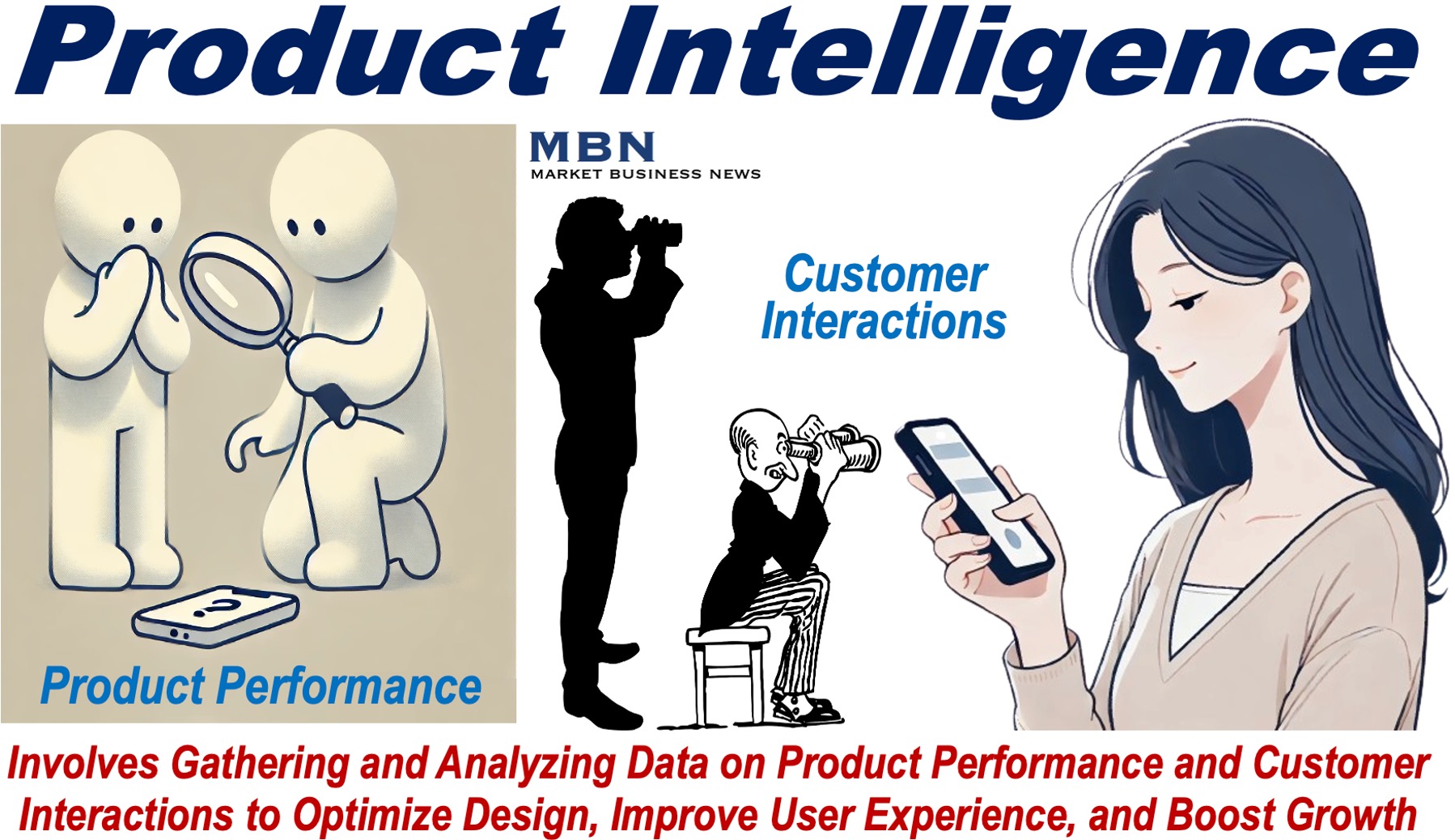Do you gather information about your product’s performance, usage, and customer interactions to understand how your products are being used? If so, you are already engaged in product intelligence.
Product intelligence can help businesses make important decisions regarding marketing, product development, and customer support.
Definitions of “Product” and “Intelligence”
-
Product
A good or service created to meet consumer needs or desires, typically offered for sale. In other words, something made or offered that consumers buy.
-
Intelligence
The term ‘intelligence’ in this context refers to the process of gathering, analyzing, and using data and information to make informed decisions and improve outcomes.
Talend.com has the following definition of product intelligence:
“Product intelligence is the process of gathering, analyzing, and acting on data related to how customers use your products. It relies on combining product data and operational data to drive product development and improve product experiences.”
“This additional data means your analyses are based on a more complete picture of how customers interact with your product, and you can uncover new insights you would not have surfaced from product user data alone.”

Product Intelligence – Gathering & Analyzing Data
If you are involved in product intelligence, you collect data from various sources, such as customer feedback, usage analytics, sales data, competitive analysis, social media insights, and market research.
You then analyze this data to identify patterns, trends, and areas for improvement. By doing so, you can better understand how your products meet customer needs and where they might be falling short.
Benefits
-
More Effective Decisions
One of the primary benefits of product intelligence is that it enables you to make data-driven decisions. Instead of relying on guesswork or assumptions, you can base your decisions on concrete evidence.
For example, if you notice that customers are frequently abandoning a specific feature of your product, you might decide to redesign or improve that feature to enhance the overall user experience.
-
Compete More Successfully
Product intelligence can also help you stay ahead of the competition. By continuously monitoring how your product is performing in the market, you can quickly identify emerging trends and adapt accordingly.
This proactive approach allows you to maintain a competitive edge by ensuring that your product remains relevant and appealing to your target audience.
With product intelligence, you can better understand how customers interact with your product, allowing you to tailor your support services to address common issues and provide solutions more efficiently.
This not only improves the customer experience but also fosters loyalty and encourages repeat business.
-
New Growth Opportunities
In addition to these benefits, product intelligence can also help you identify new opportunities for growth.
For instance, by analyzing customer feedback and usage data, you may discover unmet needs or potential areas for expansion. This could lead to the development of new features, products, or even entirely new markets.
Implementing Product Intelligence
To implement product intelligence effectively, you need the right tools and processes in place.
This typically involves using software that can track and analyze data from multiple sources, such as *customer relationship management systems, web analytics platforms, and social media monitoring tools.
* Customer relationship management (CRM) is software that manages a company’s interactions with customers and prospects, using data analysis of purchase history to improve business relationships.
Ideally, you should have a team dedicated to interpreting this data and making recommendations to effectively turn insights into action.
A Brief History of Product Intelligence
The concept of product intelligence has its roots in the broader field of data analytics and business intelligence.
Businesses have been using data to enhance products and marketing strategies for several decades. However, the specific term ‘product intelligence’ began gaining traction in the early 2000s with the rise of digital analytics tools.
Its usage became more widespread as businesses increasingly adopted data-driven strategies. The exact origin of the term is unclear, but it became common in business literature as companies sought ways to optimize product performance through detailed data analysis.
Other Forms of Intelligence
Beyond product intelligence, there are various other types of intelligence essential across different fields. Below are ten significant forms along with their definitions:
The ability to successfully navigate social settings, understand interpersonal relationships, and build meaningful connections.
The process of gathering and analyzing data on competitors to gain a strategic advantage in the market.
The gathering and analysis of data related to cyber threats, security breaches, and online vulnerabilities to protect digital assets and systems.
The practice of observing and analyzing market trends, opportunities, and risks to enhance business planning.
The capability to recognize, understand, and manage your own emotions and those of others to improve relationships and decision-making.
The innate cognitive abilities that include reasoning, problem-solving, learning, and adapting to diverse situations.
The analysis and interpretation of economic data and trends to inform financial and strategic decisions.
Technology that enables machines to replicate human cognitive tasks, such as learning, reasoning, and problem-solving.
The collection and analysis of data to generate actionable insights that drive strategic business decisions and improve performance.
The process of analyzing customer data to gain insights into their needs, behaviors, and preferences, supporting more effective decision-making.
Final Thoughts
Product intelligence is a powerful tool that helps you optimize your product, enhance customer satisfaction, and drive business growth.
By collecting and analyzing data from various sources, such as customer feedback, usage analytics, and market research, you gain a deeper understanding of how your products meet customer needs and where they might be falling short.
This allows you to tailor your support services, address common issues, and improve the overall user experience.
Additionally, having a dedicated team to interpret this data ensures that the insights gained are effectively turned into actionable recommendations, keeping you ahead of the competition and aligned with your business goals.
